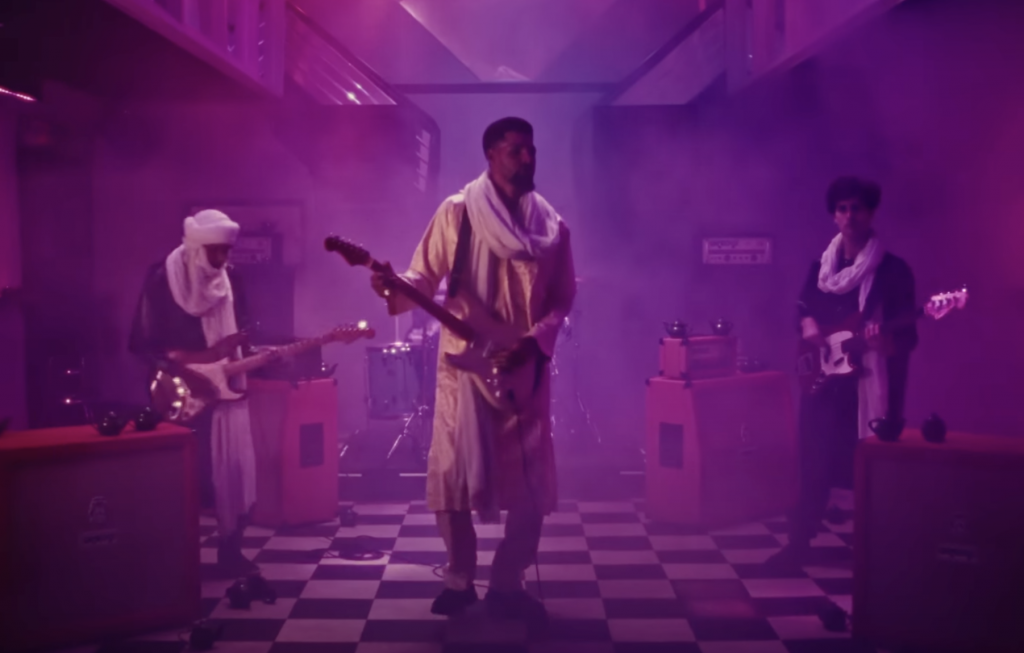Mdou Moctar’s latest release, Funeral for Justice, is less an album and more a lightning strike over the sands of Niger. It is political, unrelenting, and soaked in the kind of energy that would make most mainstream rock acts break into a nervous sweat.
There are guitarists who are technically gifted (hello, Joe Satriani et al), and then there are those who plug into something more raw, something elemental… Mdou Moctar falls into the latter category. I came into this album already a fan of Moctar’s blend of Tuareg traditionalism and psych-rock chaos, but even with that bias firmly acknowledged, this one hit different. It’s angrier, more urgent, and somehow even more technically impressive. If you’ve ever wondered what a protest march led by Jimi Hendrix might sound like, this isn’t far off.
The opening title track doesn’t so much ease you in as throw you bodily into a swirling storm of guitar feedback and rapid-fire vocals. There’s a righteousness here that feels earned, Moctar is railing against colonialism, corruption, and cultural erosion, but he’s not sermonising, this isn’t Africa’s Billy Bragg. It’s not subtle either, and thank God for that. Sometimes you just need a power chord and a battle cry.
The guitars on this record are, unsurprisingly, the centrepiece. But what’s impressive is how textured they are. Moctar isn’t just shredding for sport, though he could, and often does, and he’d probably win if he was, he’s playing with feeling. There’s a looseness and imperfection to his tone that makes it all feel incredibly human. If the sound of a guitar could literally set ears ablaze, this album would be as close to any at managing to do it.
Moctar sings in his native Tamasheq language, and while that may limit your lyrical comprehension on first listen (unless you’re fluent, in which case, I envy you), the emotion is never lost. His voice doesn’t sit politely in the mix, it claws its way to the front, demanding attention. And even when you can’t understand the words, you feel the weight behind them. There’s a grit to this album that’s both musical and thematic. Funeral for Justice is about cultural survival, about reclaiming identity, and about the fury that comes with being unheard for too long. The fact that it rocks this hard while doing it? Bonus.
It would be criminal not to mention the rest of the band. The rhythm section, made up of long-time collaborators, is tighter than ever. The drumming, in particular, deserves credit (Souleymane Ibrahim, who sadly lacks his own Wikipedia page) it’s not flashy, but it’s full of clever touches and unpredictable shifts that keep things grounded while Moctar goes full interstellar on lead guitar. The interplay between rhythm and lead has always been a strength of Moctar’s albums, but here it feels sharper, leaner, and more urgent.
Tracks like “Sousoume Tamacheq” and “Imouhar” are standout examples of this cohesion. Perhaps most impressively about the album is that there’s no filler; every track feels like it’s either pushing the message forward or musically punching you in the face (in the best possible way). This isn’t easy listening, and it’s not meant to be. There are moments on this record where the distortion is so thick, the solos so unhinged, and the vocals so emotionally raw that it borders on uncomfortable. But that discomfort is part of the point. Moctar isn’t interested in providing sonic wallpaper, he wants you to listen… closely. And then probably feel a bit guilty about your lack of political engagement, which, frankly, is fair. Having initially tried to listen to this album for review on a Sonos speaker whilst cleaning the kitchen, it quickly became apparent I needed to put down the sponge, grab a drink and use some stereo.
Bluntly, Funeral for Justice is a scorcher, an album that doesn’t just sound good, but feels vital. It’s protest music for the global stage, filtered through the soul of a guitarist who sounds like he’s trying to wring justice out of six strings and a fuzz pedal. If there IS any justice left in the world, this album will be remembered as a landmark in rock’s ongoing evolution.
Moctar might be playing desert blues, but this is anything but dry. It’s molten. And if you’re not moved by it, you might want to check for a pulse.
Author: Tom, Cardiff Store







